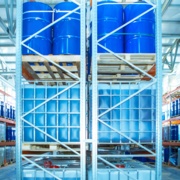
In just a few weeks’ time, we look forward to welcoming you to our 49th Annual Meeting – albeit in a slightly different format this year. Given the current situation and the social distancing rules, we’ve reluctantly decided to move the event from the sun-drenched foothills of the Santa Rosa Mountains in La Quinta, CA, to the comfort of your desk.

We’re now nine months into the 7th Cycle of Responsible Distribution, but despite our best laid plans, it’s hardly gone as expected this year. As the coronavirus pandemic has disrupted every facet of our lives, NACD has worked hard to adapt to the ever-changing situation.

Nowadays it's never been so important to stay connected — both to our friends and families, but also to our peers in the workplace and across the chemical distribution industry. Collaboration is an important part of what we do, and continued learning is key to staying current on all the latest changes, regulations, and business opportunities facing our industry. In that spirit, NACD has long offered webinars to provide ongoing education around important issues. Recently, we’ve started charging a nominal fee to participate in these educational opportunities, and I wanted to spend some time explaining why.

We’re less than two months away from election day and this contest is poised to have big implications for chemical distributors across America. The coronavirus pandemic has forced campaigns to reimagine how they reach voters during this public health crisis, and it is likely to play a key role in the outcome of the election. No matter who you support — or how you plan on voting — it’s important to show up on election day and make your voice heard by voting.

For many of our members, working from home is a relatively new concept. After all, managing and distributing chemical products in a timely, effective, and safe manner means that facilities can never fully close. Unfortunately, the current COVID crisis means the entire industry is having to get used to the idea.

Even though we haven’t been able to physically welcome our members to Washington D.C. this year to walk the halls of Capitol Hill and meet our lawmakers, we’re excited to be able to invite you to our first ever Virtual Fly-In.
With COVID-19 hampering our advocacy efforts, it’s vital we continue to engage with our elected officials and agency representatives as much as we possibly can – even if not in person. But while this rescheduled event will obviously be slightly different from the usual two-day format, and will instead be condensed into a single afternoon, there will still be plenty to talk about.

NACD’s meetings and conferences are a mainstay of our calendar – with packed programs, leading speakers, and the many networking opportunities regularly attracting hundreds of participants. Yet while the coronavirus pandemic has meant we’ve had to change some of our plans this year, we’re pleased to be able to offer those exact same benefits to our members through our new virtual events instead.
In the coming months, you’ll be able to attend some of our most popular meetings from the comfort of your own home or office.

It's already been a busy year for trade policy, with the United States-Mexico-Canada Agreement (USMCA) and the China 301 Tariffs dominating discussions.
As we inch closer to the Fall, there’s going to be little time to pause and reflect, however. Instead, we must turn our attention to the renewal of the Generalized System of Preferences (GSP) and passage of the Miscellaneous Tariff Bill (MTB) – with both program deadlines on December 31, 2020.

Third-party logistics (3PL) providers have become increasingly important to the modern distributor. Outsourcing essential services can be an efficient and cost-effective way of growing your business and meeting your customers’ needs.
There’s no big capital outlay, no need to lease a facility, buy equipment or manage employees. With a shared warehouse you only pay for your portion of the labor and management of the storage, so there are immediate efficiencies and financial benefits.

For NACD and our members, the spirit of the Occupational Safety and Health Administration’s (OSHA) Safe + Sound campaign is felt year-round – ensuring the health and safety of employees is embedded into the fabric of everything we do. That’s never been clearer to me than now. Due to the coronavirus pandemic, workplace safety guidelines may look different than they did a year ago, but the swift adjustments that our members have made over the last several months underscore the importance of our longstanding commitment to making continuous improvements and always putting safety first.